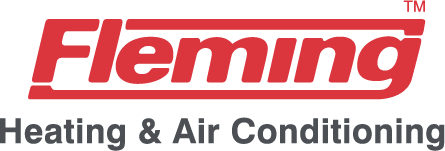
If you’re questioning whether your South Beloit and Belvidere home has bad indoor air quality (IAQ), it probably does.
We are indoors a lot. In reality, we’re in a building up to 90% of the time, according to the U.S. Environmental Protection Agency. And the air inside homes could be 2–5 times more contaminated than outdoors, which can create long-term health issues.
Most Common Origins of Bad IAQ
We’ve compiled a list of the most frequent sources of bad IAQ, the issues they create and how you can remedy these indoor air pollutants. If you’re concerned about the air inside your house, we advise consulting with a professional like Fleming Heating & Air Conditioning Inc about which products are ideal for your house.
Volatile Organic Compounds
Volatile organic compounds, or VOCs, are vapors released by everyday household things.
They’re found in paint and stains as well as:
- Furniture
- Carpet
- Building materials
- Cleaning products
- Cosmetics
- Air fresheners
- Candles
When these chemicals accumulate indoors, they can irritate your eyes, nose and throat. They might also cause headaches and nausea. Regardless of whether your home is in a rural or industrial location, an EPA study found indoor levels of these pollutants can be 2–5 times worse than the air outdoors.
Always follow the manufacturer’s guidelines when painting or cleaning. Unlatching a window can help vapors disperse faster.
Air purification systems can also make it better. This equipment partners with your heating and cooling system to improve indoor air. When hunting for a system, ensure it’s specifically created to eliminate VOCs.
Dust and Pet Dander
Dust and pet dander can trigger health problems like asthma and allergies, especially when it continually gets moved by your residence’s comfort unit. While you can vacuum more frequently and install an improved air filter, an air filtration system could be a better fit.
This solution hooks to your heating and cooling equipment to provide mighty filtration. Some kinds offer hospital-level filtration for removing particles and bioaerosols.
Persistent Odors
New residences are closely sealed to increase energy efficiency. While this is great for your energy expenses, it’s not so good for your IAQ.
Stuffy odors can hang around for a greater amount of time since your home is pulling in less fresh air. Because keeping your windows open throughout the year isn’t doable, here are two methods you can make your indoor air smell better.
An air purification system is put in your HVAC system to neutralize odors before they recirculate. Search for one with a carbon filter and the capability to wipe out damaging VOCs. This equipment can also help keep your family healthy by wiping out most bacteria and ordinary allergy triggers like pollen and mold spores.
A ventilation system pulls out stale indoor air and substitutes it with clean outdoor air. There are two models of units (heat recovery and energy recovery), so check with our professionals for more info on which solution is ideal for your residence.
Unbalanced Humidity
It’s essential your house’s humidity stays even. Air that’s too moist can lead to mold, while dry air can create respiratory symptoms.
Our experts suggest 40–50% for top comfort. To keep yours steady, think about getting a whole-home humidifier or whole-home dehumidifier with your HVAC unit.
Instead of having to pull a humidifier from room to room, this equipment delivers balanced humidity across your house.
Carbon Monoxide
Carbon monoxide is colorless gas you can’t smell. It’s a byproduct of insufficient combustion in fuel-burning equipment, like gas heating systems, water heaters or fireplaces.
It produces an extreme health risk. In small levels, it can create flu-like ailments like headaches and nausea. It can be deadly in heavy concentrations.
We recommend annual furnace maintenance to make sure your system is operating like it should. This work allows our technicians to discover problems before they start, including malfunctions that can cause carbon monoxide leaks.
The best method to keep your house free of carbon monoxide is to put in detectors. These alarms must be on each floor near bedrooms and living areas.
Better Your Home’s Air Quality with the Fleming Heating & Air Conditioning Inc Experts
Aware that your residence has inferior air quality but not sure how to make it better? Or unsure which product is best for you? Give our friendly HVAC professionals a call at 877-389-2465 or contact us online now. With free estimates and expert support, we’ll help you choose the ideal option for your home and budget.


